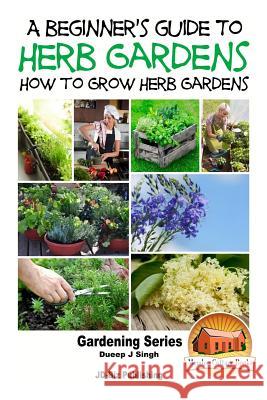A Beginner's Guide to Herb Gardening - How to Grow Herb Gardens » książka
A Beginner's Guide to Herb Gardening - How to Grow Herb Gardens
ISBN-13: 9781517670436 / Angielski / Miękka / 2015 / 42 str.
Table of Contents Introduction How to Lay Out a Herbal Garden Thinking of Layout Plans Making Paths Best Flower Choices Making a City Herbal Garden Making Leaf Mold Making Natural Organic Compost Feeding the Soil My Way of Planting Making Soil Beds Wooden Boxes as Plant Containers Window Boxes Other Containers Herb Growing Project for Children Suitable Herbs for Your Garden Permanent shrubs Perennials for herb borders and for beds Biennial Plants Window Box Herbs Windowsills inside your house Culinary and Beauty Uses of Herbs Elderflower Water Conserves Herbal wines Herbal Force Meat Stuffing Apple and Mint Jam Conclusion Author Bio Publisher Introduction The moment you hear the word "Herb" you visualize a soft stemmed plant, which is normally used in cookery, as well as in alternative medicine. These herbs used for millenniums have been an important part of our social traditional and religious fabrics all over the world. No one, without an interest in nature is not going to know more about Rosemary, sage, lavender, thyme, hyssop, basil, and other herbs put into use down the centuries. The awareness of the medical as well as the edible qualities of herbs, was naturally gained in prehistoric days by happy and sad experience. When food was nasty tasting or scarce, the pungent herbs made it more delicious and acceptable to eat. Leafy herbs provided vegetables and salads. Soon people began to find out that some herbs would also heal wounds and ease suffering. So that means that even the herbs that we supposedly used for culinary purposes could be used for healing purposes. In 460 B.C. Greeks were writing about the curative powers of plants. In the East, these herbs were used in alternative medicine, through medical books and compendiums written more than 5000 years ago. In Europe, all medical treatment based on herbs was done, thanks to a book written by Dioscorides in A.D. 60. In ancient Europe, The Greeks, Egyptians and the Romans could not do without their herbs. Culinary delights, especially the blending of sauces, which were made of flowers, herbs, spices and wines were possibly started in a Greek country named Sybaris, from where we get the term "sybarite," or a person who enjoys pleasure. They were the people who made sleeping on rose petals, a fashion. All the herbs and the flowers which were used to keep the Sybarites happy were grown in the gardens in the plains of Possidonia and you can still see them today. The regular use of a large variety of flowers and herbs for medical and culinary purposes has just come down the ages to us since ancient times. However, in the early - mid-19th century with the rise of industrialization, the popularity of herbs began to grow lesser, because people started to clear up large tracts of lands on which herbs grew, to give way to cities and human settlements. In fact, one great forest in the USA, Limberlost made popular in the writings of a writer and naturalist, Gene Stratton Porter was totally destroyed due to the felling of timber. If Teddy Roosevelt was not such an ardent and dedicated naturalist, many of the great green forest areas of the USA, which are now natural forest reserves, with herbs still present in them, would have been destroyed through man's encroachment and greed. So apart from these herbs still available in the wilderness, this book is going to tell you how to make an Herb gardening your own house. Thanks to the revival of interest and appreciation of herbs in the 21st century to heal and to cure and to beautify you, people with gardens are realizing the beauty of herbal plants. They are also learning the added pleasure of growing them in their garden, so that they can use these herbs freshly picked. People living in flats are raising these herbs on windowsills by planting them in window boxes. In town gardens, you can grow them in wooden tubs, boxes, and even in large pots on balconies and in your backyards.
Zawartość książki może nie spełniać oczekiwań – reklamacje nie obejmują treści, która mogła nie być redakcyjnie ani merytorycznie opracowana.











